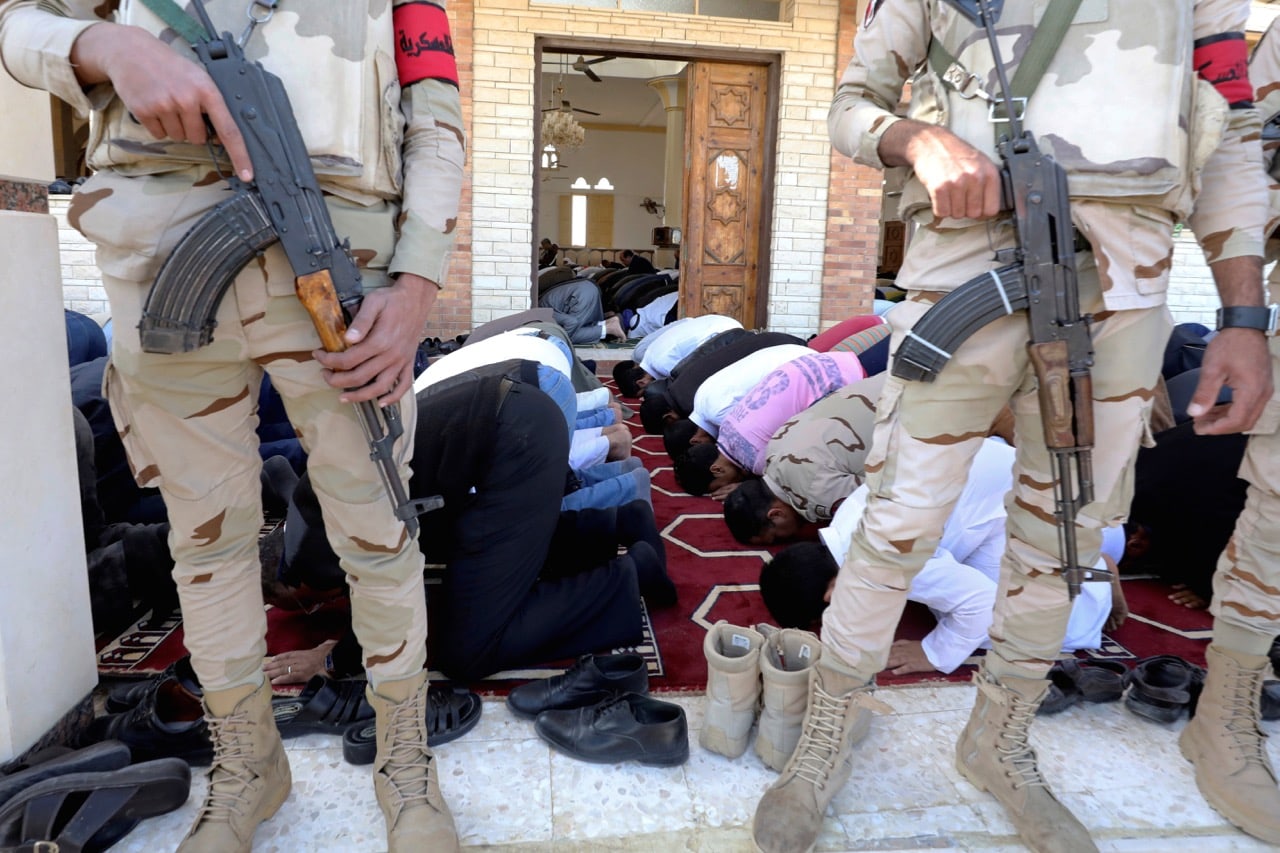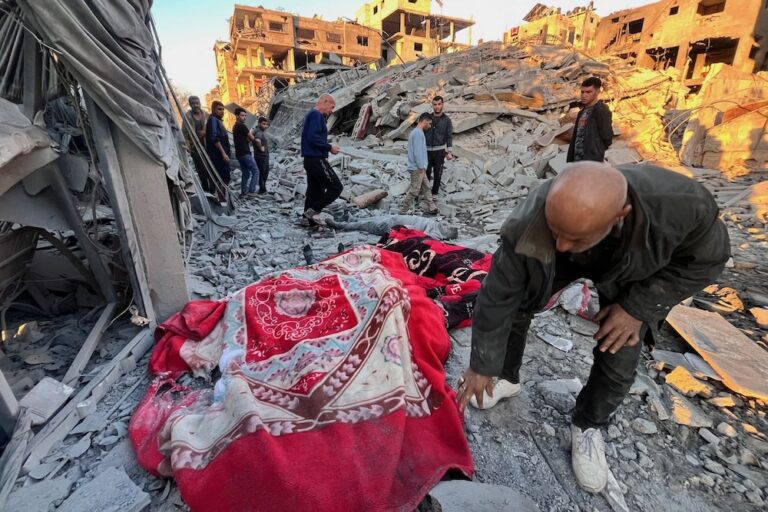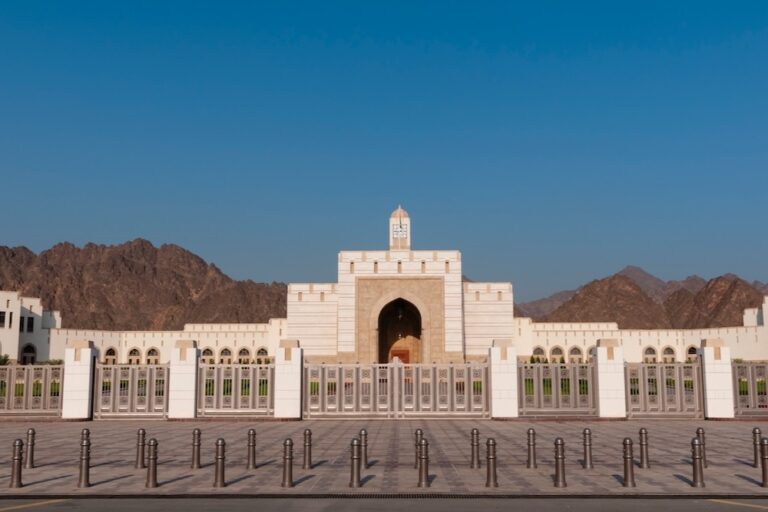As the saga of Saudi's hunted elites commanded attention across the Middle East and North Africa this November, news of the region's less powerful prey fell by the wayside. Authorities in Kuwait, Bahrain, Libya, Morocco, and Egypt went after protesters, journalists, and human rights defenders critical of their regimes.
Kuwait
On 27 November 2017, a Kuwaiti appeals court sentenced 67 citizens, including a prominent opposition leader, current and former members of parliament and a human rights defender to between one and seven years in jail over accusations of storming Parliament in 2011. The Gulf Center for Human Rights has called the charges “fabricated” and the trial “unfair”. Prominent opposition leader Musallam Al-Barrak, who had been released in April after serving two years in prison, was sentenced to nine years, and human rights defender Suleiman Bin Jassim, co-founder of the National Committee for Monitoring Violations, was sentenced to five.
Bahrain
Bahraini authorities doubled down on a crackdown on opposition figures this month. Despite an international campaign calling on the European Union, the United Kingdom, and the United States to raise, both publicly and privately, the case of Nabeel Rajab, one of the Gulf’s most prominent human rights defenders, and call for his release, an appeals court on 22 November rejected his appeal and upheld a two-year sentence against him. Rajab, who has been languishing in prison since 13 June 2016, is also facing charges in another trial that could lead to up to 15 years in prison. The Bahrain Center for Human Rights (BCHR), of which Rajab is co-founder, the Gulf Center for Human Rights, Americans for Democracy and Human Rights in Bahrain, and Index on Censorship have all published statements decrying the court’s decision.
Rajab was not the only critic of the regime targeted by the courts in the past month. A blogger and a journalist arbitrarily convicted on terrorism charges were sentenced to life imprisonment and 15 years in prison, respectively. Using a “more silent weapon of censorship”, as UN Special Rapporteur for freedom of opinion and expression David Kaye described it, Bahraini authorities prevented Nedal Al Salman, Head of International Relations and Women’s and Children’s Rights Advocacy at BCHR, from traveling outside Bahrain. This is the latest of several incidents in which Ms. Al Salman has been placed under travel ban and thus restricted from participating in international fora.
Morocco
In Morocco, as reported by Reporters Without Borders, an ongoing trial of 54 detainees related to their involvement in the northern region’s Hirak movement has been characterized by mistreatment in both the prison and the courts. Amongst the detainees are a journalist, and five citizen journalists and media workers. Badil.info news website editor Hamid El Mahdaoui has been in solitary confinement for several months, his colleague Rabiaa El Ablak began a third hunger strike on 9 November and all 54 defendants are being prosecuted unjustly under the criminal code and the law on public gatherings.
Egypt
This month, as Egypt reels from the deadliest terrorist attack in its modern history, President Abdel Fattah El-Sisi, who claims to have made fighting terrorism his number one priority, continues to pour state resources into targeting those who dare criticize his policies – and he continues to do it under the pretext of countering terror.
In a 24 November joint letter to the United Nations High Commissioner for Human Rights, Zeid Ra’ad Al Hussein, 11 organisations including IFEX members PEN International, ARTICLE 19, and Index on Censorship, listed the many tactics the Sisi regime uses to systematically crack down on free expression. The letter stated that authorities in Egypt use the judicial system by employing the repressive protest law, terrorism law, and media and publishing law to prosecute journalists, activists, opposition figures, and human rights defenders. Some of the most severe violations at the hands of the security forces include: summary executions, enforced disappearances, torture, rape, arbitrary arrests, and unfair trials.
In the most recently reported incident, according the Arabic Network for Human Rights Information, liberal satirist Islam Al Rifai was abducted and disappeared on 16 November. Al Rifai was accused of belonging to a dangerous group and was detained for 15 days pending investigation. A recent Human Rights Watch report comprehensively documented the routine torture that political detainees are subjected to in Egypt’s prisons. In an in-depth piece published on 29 November, the Association for Freedom of Thought and Association shed some light on the case of imprisoned journalist Ismail al Eskandarani, who had completed two years in administrative detention at the time of publishing. According to RSF’s database of jailed journalists, al Eskandarani is one of 14 journalists currently imprisoned in Egypt.
Also this month, ANHRI launched a new website, in both English and Arabic, dedicated to documenting in detail every public interest case currently in the courts post-2011.
In Brief
In Libya on 3 November, forces belonging to the UN-backed government stormed a comic book festival Comic Con, in Tripoli. They arrested festival organizers, confiscated computers, and then shut the event down. Organizers were accused of “carrying out acts of indecency and public immorality.”
In Algeria this month, a fixer, who has been held by authorities since June, was formally indicted on a charge that carries a possible life sentence. An editor, who accused the government of financially strangling her independent newspaper, went on hunger strike on 13 November in protest. Hadda Hazem is not the first Algerian editor to resort to such action, and according to ANHRI, more than 60 Algerian newspapers have gone out of business for financial reasons since 2014.
In Iraq, a prominent writer and activist, Saad Salloum, and his colleagues at the Masarat Foundation for Cultural and Media Development, have been subjected to death threats by an unknown Islamic group this month. PEN International has publicly raised concern for Salloum and his colleagues’ safety.
In the United Arab Emirates, on 9 November, two Swiss journalists were arrested and held in isolation for more than 50 hours. They suffered long interrogations in different locations, were blindfolded when transferred, and had to sign confessions in Arabic without knowledge of the contents. They were released on 11 November and allowed to return to Switzerland but had to leave behind all confiscated equipment.
Five years ago this month British reporter John Cantlie was kidnapped in Syria. RSF has called on the British government to renew efforts to secure his immediate release.
Gender in Focus
IFEX members Social Media Exchange (SMEX), BCHR, and MADA put gender issues front and center this month.
SMEX, in collaboration with Oxfam and the Knowledge Workshop, organised a two-day event bringing feminists, techies, and civil society from across the Middle East and North Africa to Beirut on 24 and 25 November to contribute to a global discussion on the intersections of gender and technology.
BCHR released a report on 14 November shedding light on the many ways Bahraini authorities silence women journalists and activists while projecting to the international community an image of reform and progress on women’s rights.
On 29 November, the Palestinian Center for Development and Media Freedoms (MADA), held a one-day conference in Ramallah revolving around the challenges faced by women journalists based in Palestine.



